Note the ‘demand destruction’ refers to the slowing of the growth of demand, not a contraction.
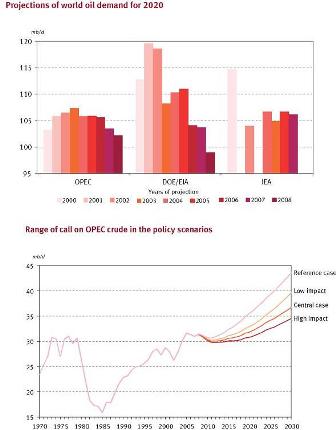
Oil Demand Forecast
[top]

Note the ‘demand destruction’ refers to the slowing of the growth of demand, not a contraction.

[top]
Seems to me GM and the banks need the same thing: people who have sufficient income to buy cars and make mortgage payments.
In general, direct public spending is for public goods: military, legal system, various infrastructure, etc.
To support private sector output the way to go is to support demand, and let consumers decide which products succeed and which don’t.
If government had declared a payroll tax holiday (treasury makes the fica payments for employees and for the business) three months ago, car sales would be up and mortgage delinquencies down.
And don’t forget to toss in something that reduces fuel consumption sustain our real terms of trade.
[top]
Looks like payback for political help, not ‘change’:
Members of the Transition Economic Advisory Board:
[top]
Bad news, the Feds outstanding (unlimited) swap line draws were up $27.9 billion to $573.9 from last week’s report.
That’s a larger increase than the approximately 24 billion increase the week before.
This is not good.
Each increase gets us closer to the day when the Fed says ‘no mas’.
Causing the euro’s decline to accelerate as the eurozone faces collapse.
http://www.federalreserve.gov/releases/h41/Current/
[top]

| Survey | -200K |
| Actual | -240K |
| Prior | -159K |
| Revised | -284K |
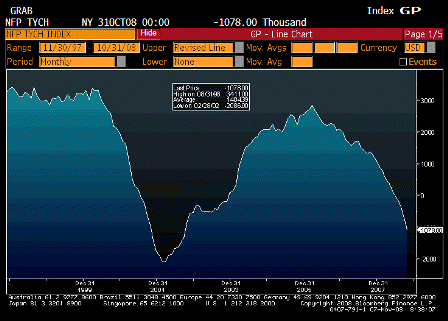
| Survey | n/a |
| Actual | -1078.00 |
| Prior | -698.00 |
| Revised | n/a |

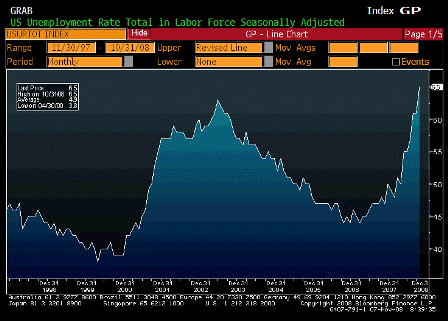
| Survey | 6.3% |
| Actual | 6.5% |
| Prior | 6.1% |
| Revised | n/a |
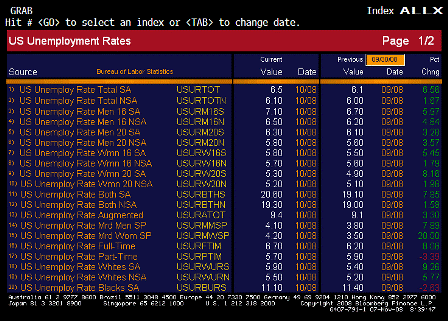
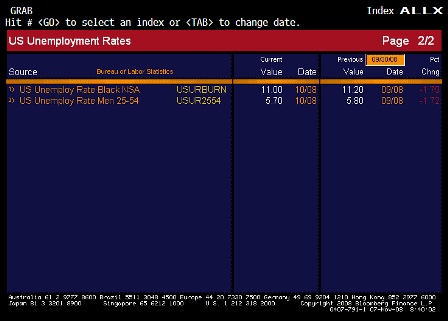

| Survey | -65K |
| Actual | -90K |
| Prior | -51K |
| Revised | -56K |
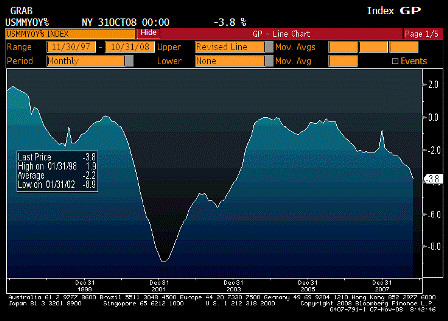
| Survey | n/a |
| Actual | -3.8% |
| Prior | -3.2% |
| Revised | n/a |

Karim writes:
Payrolls:
Worse than expected (but that was expected)
By industry:
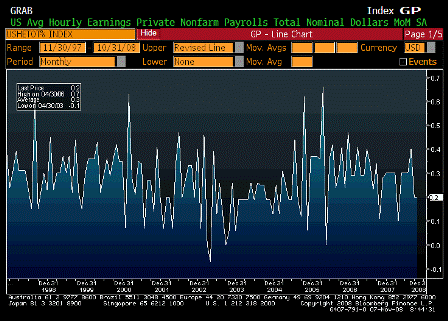
| Survey | 0.2% |
| Actual | 0.2% |
| Prior | 0.2% |
| Revised | n/a |
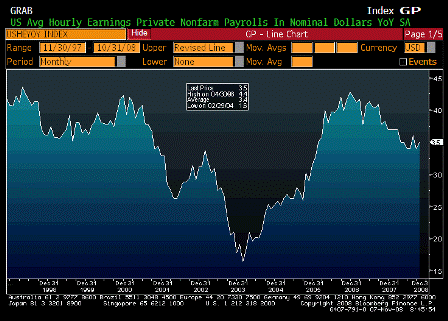
| Survey | 3.5% |
| Actual | 3.5% |
| Prior | 3.4% |
| Revised | n/a |



| Survey | 33.6 |
| Actual | 33.6 |
| Prior | 33.6 |
| Revised | n/a |

| Survey | 0.3% |
| Actual | -0.1% |
| Prior | 0.8% |
| Revised | 0.6% |
Falling?
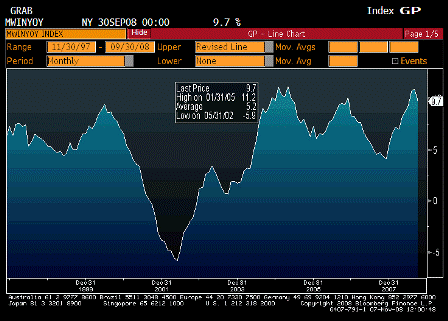
| Survey | n/a |
| Actual | 9.7% |
| Prior | 10.9% |
| Revised | n/a |
Past the peak?



| Survey | n/a |
| Actual | 89.2 |
| Prior | 93.5 |
| Revised | n/a |
Still a mini trend higher.

| Survey | -3.4% |
| Actual | -4.6% |
| Prior | 7.4% |
| Revised | 7.5% |

| Survey | n/a |
| Actual | 7.7% |
| Prior | 5.1% |
| Revised | n/a |
Not bad! probably lots of foreclosure sales.
[top]
Initial recommendations for President Obama:
[top]
Falling consumption and rising unemployment means the private sector wants to work and get paid, but doesn’t want to spend its earnings on consumer goods.
No problem!
Depending on one’s politics, this allows government to increase spending to employ the idle resources for public purpose, such as infrastructure, etc.
Or alternatively, to cut taxes until consumption resumes. Or some combo of both.
The government spending is not financially constrained. The applicable constraint is the quantity of real resources offered for sale.
[top]
BOJ Helpless as Yen Rises on Carry, UBS, Barclays Say
by Ron Harui and Stanley White
Nov. 6 (Bloomberg) — The Bank of Japan may be powerless to prevent the yen from rising to a 13-year high, according to the world’s biggest foreign-exchange traders.
Wrong! Japan can sell yen and buy dollars until the cows come home, if they wanted to. What’s stopping them (so far) is the risk of Paulson’s wrath.
As the US-Paulson/Bernanke/Bush- continues its ‘weak dollar’ policy to support US exports. Falling crude prices have (temporarily?) thwarted their efforts and strengthened the dollar. (And the euro has it’s own special issue as previously discussed.)
[top]
>
> On Thu, Nov 6, 2008 at 7:09 AM, Michael wrote:
>
Obama’s Yuan Calls May Put U.S. on Collision Course With China
by Judy Chen
Nov. 6 (Bloomberg) — Barack Obama’s calls for changes in China’s yuan policy may put the president-elect on a collision course with the U.S.’s second-largest trade partner, which is holding the currency stable to support its export-led economy.
Obama said China must stop manipulating the currency in a letter to the National Council of Textile Organizations released on Oct. 24.
This is counter productive for the US standard of living.
Obama has yet to discover imports are real benefits and exports real costs.
The People’s Bank of China has kept the yuan almost unchanged against the dollar since mid-July as it shifts focus from countering inflation to sustaining growth amid a global credit crisis. The Foreign Ministry said last week the U.S. shouldn’t blame its trade deficit on exchange rates.
“Obama may exert more pressure on China’s foreign-exchange policy to boost U.S. exports and curb unemployment, but China will first consider its own economic fundamentals,” said Ha Jiming, Hong Kong-based chief economist at China International Capital Corp., the nation’s first Sino-foreign investment bank.
Hopefully, Obama will see the light and it will instead be a case of ‘when the facts change I change’.
Policy of Stability
Paulson said on Oct. 21 that he is “pleased” that China’s currency has appreciated more than 20 percent since a peg against the dollar was abandoned in July 2005.
Paulson either has it backwards, or he’s being subversive.
“It will be emphasized in the next Strategic Economic Dialogue that it is more important than ever that China should rely more on domestic demand rather than its trade surplus to sustain economic growth,” said Nicholas Lardy, senior fellow at the Peterson Institute for International Economics in Washington.
Same- ignorant or subversive are the only possibilities.
“Currency manipulation has been a quite specific implication in law, and no other president has ever used that term,” said Straszheim. If Obama doesn’t take actions following the charge that China is manipulating the yuan, “he will be regarded as another old type politician who promises one thing during the campaign and does another in office,” he added.
[top]
ECB to Cut Rates as Slump Calls for `Radical Action’
by Christian Vits
Nov. 6 (Bloomberg) — The European Central Bank will cut interest rates for the second time in less than a month today as the region’s economy suffers its worst slump in 15 years, economists said.
“It’s time for radical action,” said Ken Wattret, an economist at BNP Paribas SA in London. “This is a very severe economic downturn, interest rates should come down a long way.”
Obviously they still haven’t figured out lower rates will make matters worse, as lower rates cut government interest payments (it’s a spending cut) which removes income paid to the private sectors.
The only aspect that might help is the hope that the lower rates drive the currency lower. This is one of those ‘be careful what you wish for’ conditions.
First, with falling aggregate demand around the world, export growth will be problematic even with the lower real wages that come from a lower currency.
Second, a falling currency raises import prices and reduces real terms of trade, particularly for a large energy importer like the eurozone.
Third, anything that weakens the economy and lowers standards of living is socially dangerous.
Fourth, the problems of USD debt including USD losses growing as a % of euro based capital and income that have been driving the euro down remain and the risk of an acceleration of this process increases as the eurozone economies weaken.
[top]